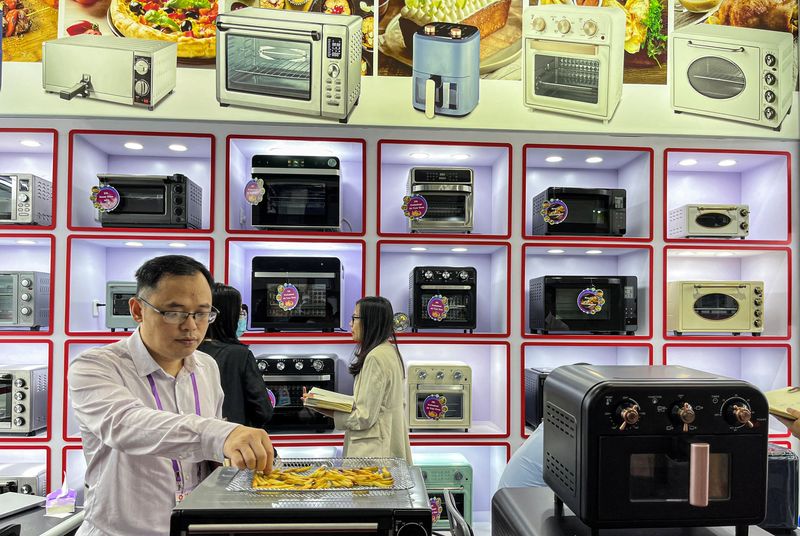By Ellen Zhang and David Kirton
GUANGZHOU (Reuters) -Chinese exporters exhibiting their products at the country's largest trade fair said the weak global economy was hurting their businesses, with many freezing investments and some cutting labour costs in response.
The subdued mood at the Canton Fair in the southern city of Guangzhou suggests China's unexpected jump in exports in March may have reflected exporters catching up with orders delayed last year by COVID curbs rather than renewed economic strength.
The first major trade event since China abruptly dropped COVID restrictions and re-opened its borders comes as sharply higher borrowing costs in the United States and Europe hit demand for Chinese-made goods.
Kris Lin, a representative from Christmas light producer Taizhou Hangjie Lamps, said this year's orders so far are down 30% from last year.
"The difficulties last year came from logistics and production disruptions but the local government helped solve the problems. That's an internal issue. Now we have external problems. We can't solve those," Lin said.
"This year will be the hardest for us," he said, with higher electricity costs caused by the war in Ukraine reducing demand for his decorations even further.
Lin said the company cannot afford to sell at lower prices, but it may look to reduce labour costs. The firm relies on contract workers who get released in September to October after the delivery of Christmas orders.
"If orders are weak this year, I will set my workers free earlier."
Huang Qinqin, sales director at Zhong Shan Shi Limaton Electronics, a producer of exhaust fans, has similar thoughts on cutting costs after orders halved in the first quarter.
"In our factory, workers come to work when there are orders," Huang said. This used to mean working overtime even on weekends, but it is more common this year for workers to take weekends off, she said.
A producer of shaving devices from the eastern city of Ningbo, who asked to remain anonymous to unveil future plans, said the firm had already laid off workers and will lower prices in coming months if orders don't improve.
The worsening outlook for workers in the manufacturing industries will raise concerns among policymakers, who target 12 million new jobs across China this year, up from last year's goal of 11 million.
Dozens of Chinese suppliers told Reuters they did not intend to spend much on improving production lines this year given the weak demand.
"We have no plan to increase investment," said Luna Hou, sales representative at Topgrill, which makes outdoor grills and has cut prices by 5% to lure buyers.

Vicky Chen, foreign trade manager at socket producer Qinjia Electric, said she did not expect a big sales boost at the fair, which runs until May 5.
"The whole global economy is fairing poorly at the moment, and the fair won't change that."
(Ellen Zhang David Kirton; Writing by Marius Zaharia; Editing by Tom Hogue)